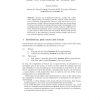Free Online Productivity Tools
i2Speak
i2Symbol
i2OCR
iTex2Img
iWeb2Print
iWeb2Shot
i2Type
iPdf2Split
iPdf2Merge
i2Bopomofo
i2Arabic
i2Style
i2Image
i2PDF
iLatex2Rtf
Sci2ools
132
click to vote
AMSTERDAM
2009
2009
Some New Observations on 'Because (of)'
Because (of) is ambiguous between a `reason' and a `plain cause' interpretation. Presenting a semantic analysis within the framework of Discourse Representation Theory, I argue that because (of) always denotes a causal relation between causing facts and caused entites of various sorts and that its interpretational variance is dependent on the ontological nature of the caused entity. Finally, I point to a difference between sentential-complement because and nominal-complement because of with regard to their interaction with modals. Whereas both because and because of may outscope e.g. deontic necessity modals, only because may outscope epistemic modal operators.
AMSTERDAM 2009 | Deontic Necessity Modals | Discourse Representation Theory | Epistemic Modal Operators | Logical Reasoning |
Related Content
| Added | 16 Feb 2011 |
| Updated | 16 Feb 2011 |
| Type | Journal |
| Year | 2009 |
| Where | AMSTERDAM |
| Authors | Torgrim Solstad |
Comments (0)

